Last Updated: 04/06/2025
Probiotics for Cats
Probiotics are increasingly popular in human health - and your cat can reap the benefits too!
Author: Dr Carla Paszkowski BVSc (Hons)
Reading Time: 37 minutes - long read
Ever since the early 1900s when Russian scientist Elie Metchnikoff first discovered that fermented dairy products were responsible for enhancing the lifespan of Bulgarian rural people, probiotics have been a popular topic. With more and more research supporting the link between the microbes in our gut and positive health effects, more and more people are eager to reap the benefits.
As the human probiotic market expanded, it wasn't long before probiotic products specifically designed for pets emerged. There are now dozens of cat probiotic supplements available in Australia. With so many products available, and so many cats who suffer from tummy troubles, many cat owners are left wondering: should I give my cat a probiotic? And if so, which cat probiotic is best?
To help you navigate the world of probiotics for cats, I've constructed this complete guide. From questions about the benefits of probiotics and whether you can give human probiotics to cats, as well as a comparison of the best pet probiotics on the Australian market, this guide should cover everything you need to know about cat probiotics.
DID YOU KNOW? There are 10 times more microbes in the body than cells!
What are probiotics?
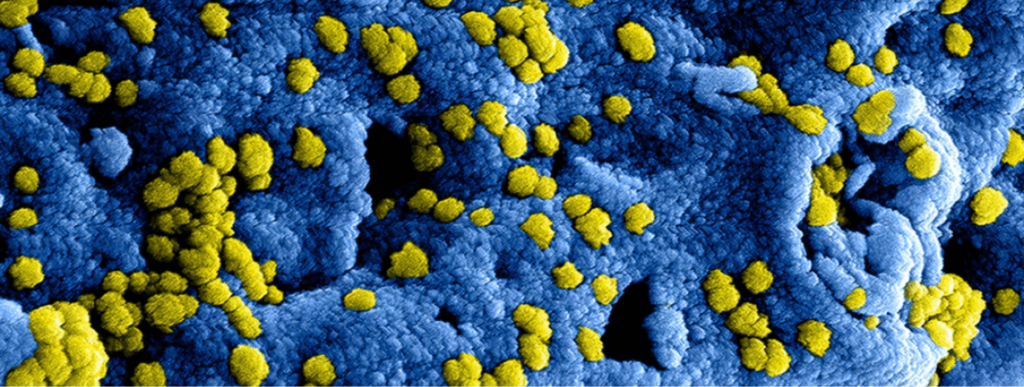
Probiotics are the "friendly" bacteria and yeasts that live in the gastrointestinal system. This population of microbes in the gut is also known as the 'gastrointestinal microbiome' or 'gut microflora'.
All animals (including cats) have billions of "good bacteria" in their gut microbiome. These bugs help fight infections, strengthen the immune system, digest food, and produce nutrients for absorption. A healthy microbiome should have a varied and diverse population made up of a mix of different microbe species - this healthy mix is also known as 'biodiversity'.
Probiotic supplements (and some probiotic foods) provide live species known to be beneficial directly into the gut. Probiotics may help restore the natural balance of the microbiome, and are particularly beneficial after illness or a course of antimicrobial medication.
Definitions: What's the difference between a Probiotic and a Prebiotic?
Probiotics desposit live good bacteria directly into the gut. This helps establish populations of known beneficial bacteria in the gut by providing organisms directly.
Prebiotics deposit 'food' for the good bacteria - usually fibre - into the gut. This food helps the microbes thrive and grow. Prebiotics are selectively fermented fibres that the microflora feed on, including disaccharides (lactulose, tagatose), oligo- or polysaccharides [fructo-oligosaccharides (FOS), mannan oligosaccharides (MOS), or long-chain prebiotics like inulin.
What bacteria species are in your cat's gut?
Domestic cats are obligate carnivores, which means they depend on high intakes of animal tissue. This has led to an adaptation to a low-glucose and high-protein metabolism, and compared to humans they are less dependent on the gut microbiome for energy via microbial fermentation. Nevertheless, a stable and balanced microbiota remains critical to maintain gut health.3
Cats have a number of species of friendly bacteria in their gut, which are quite different to humans and dogs thanks to their obligate carnivore diet. Each section of the gastrointestinal tract (stomach, small intestine, large intestine, colon) house different populations of dominant bacteria, with the large intestine harbouring the most dense and diverse.4 The species present also varies greatly from animal to animal. But in general, most identified species fall into four phyla: Firmicutes, Bacteroidetes, Proteobacteria, and Actinobacteria.3
However, rather than get bogged down by the species names, it's important to focus on establishing a stable, biodiverse population with a good balance of different species. When the microflora is unbalanced and the diversity of the population is out of whack, problems can ensue. This misbalance is also known as 'dysbiosis'.
What causes the gut microflora to become unbalanced in cats? Dysbiosis may occur after a course of antibiotics, a change in diet, a parasite infection, food poisoning, when weaning off milk, or during times of stress. Disrupted microflora can lead to signs including diarrhoea, vomiting, gas, bloating, and a compromised immune system.
With this in mind, it makes sense that establishing and maintaining populations of desirable bacteria in the gut is an important part of treating gastrointestinal diseases in our pets.
The Benefits of Probiotics for Cats
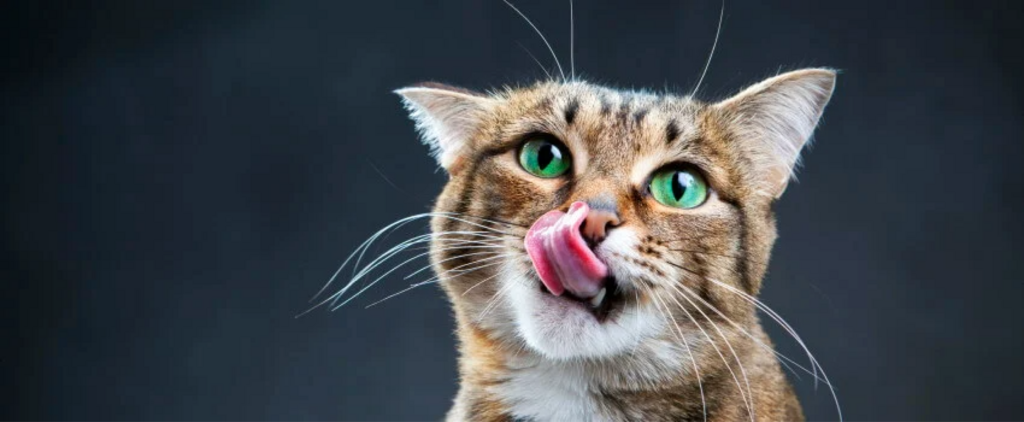
Probiotics offer a number of benefits for pets. By helping the "good" microbes thrive, they promote the health benefits that are naturally offered by these bugs.
Specifically, Lactobacillus and Bifidobacterium can help to:

Reduce diarrhoea and gas

Reduce the symptoms of food allergies

Reduce the symptoms of food allergies

Manage yeast or harmful bacteria overgrowth

Bacillus species can also support the immune response
The microbiome can simultaneously function as pro- and anti-inflammatory, maintaining a balance to stop excess inflammation while still responding to infections.1
The microbiome can even impact brain function. Around 90% of the body's Serotonin - the 'happy hormone' - originates from the intestines, and the production of this hormone is directly influenced by the gastrointestinal microbiome.2
How do probiotics work?
The health benefits listed above are all thanks to 3 main functions of good bacteria:
1. They compete with harmful germs. Probiotic microbes can compete with potential pathogens (like Salmonella) by taking their place on receptor sites and preventing them from adhering to the intestinal lining and being absorbed.6
2. They can act as a natural antibiotic. Some species of microbes secrete antimicrobial substances such as fatty acids, lactic acid and acetic acid.7 Some Lactobacillus species can also decrease the amount of toxins produced by harmful bugs including Salmonella, E.coli or Clostridium perfringens.
3. They kick-start the immune system. This is particularly strong within the cells of the intestinal wall. When bacteria consume fibre, they produce short chain fatty acids (SCFAs), including acetate, proprionate, and butyrate. These short-chain fatty acids produced by probiotic microbes support immunity by in a number of different ways:
Short-chain fatty acids produced by probiotic microbes help support immunity by:

Feeding friendly bacteria and discouraging the growth of harmful bacteria

Helping to form the protective mucus layer in the gut

Strengthening tight junctions between cells (ie, preventing leaky gut)

Decreasing glucose levels, which protects against metabolic disease and obesity

Building important T-cells in the immune system, which helps reduce chronic inflammation

Helping the body absorb important nutrients including calcium, magnesium, and iron
When should I give my cat a probiotic?
Any cat who has recently been treated with a course of antibiotics may benefit from a probiotic supplement. Additionally, you may wish to give a probiotic for ongoing maintenance for any chronic gastrointestinal, skin, or allergic condition.
Anecdotally, probiotics are often reported to assist cats with chronic gastro condiitons such as a sensitive stomach, recurrent diarrhoea, vomiting, food sensitivities, bloating and gas, as well as those with chronic allergies. It's possible that these cats are also treated with courses of antibiotics more frequently than other cats, which may be the reason for the noticeable improvement. But regardless of the reason for the success, many believe that probiotics are worth a try - and they certainly can't do any harm.
Can I give human probiotics to my cat?
A probiotic supplement that is safe for humans isn't necessarily also safe and effective for cats. Not only do humans possess different microbial populations to cats, but probioitic products may contain other ingredients in the capsule or tablet that are not safe for cats.
However, many probiotic foods - such as unflavoured yoghurt or kefir - may be safe for cats in small quantities.
What are the best probiotics for cats?
Now that we know that science has established the link between the microbiome in the gut and immune and digestive health, the next step is figuring out how to manipulate the microbiome for good. There are actually many ways to alter the gut microbiome - including probiotics, prebiotics, faecal transplants, and dietary changes.
The Best Probiotics for Cats Compared
Other options: Diets, Foods, and Natural Prebiotics
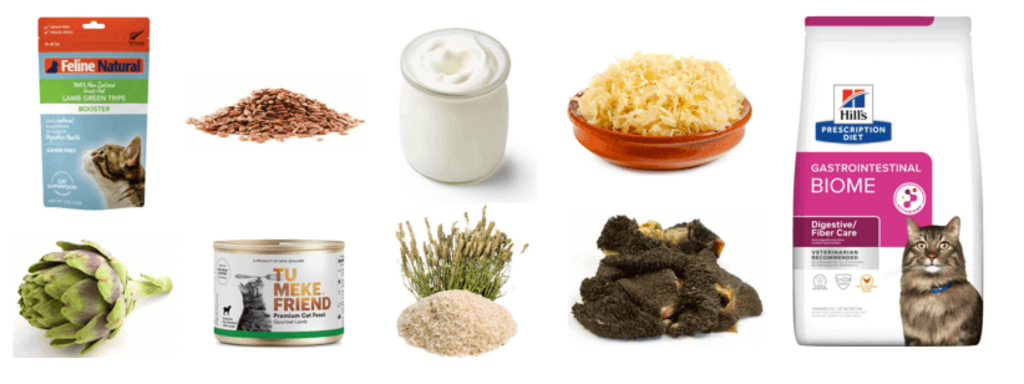
Aside from pet-specific probiotic supplements, there are plenty of ways to promote the health of your cat's microflora. Certain fermented foods that us humans take to promote a healthy gut are also safe and beneficial for cats, and there are even special cat foods designed with prebiotic blends to promote the health of gut microbes.
Probiotic Foods that are Safe for Cats
1. Yoghurt and Kefir
Verdict: Safe for cats in moderation
Fermented dairy products like yoghurt and kefir have long been known to provide probiotic benefits. Thanks to the lactic acid-producing bacterial cultures used in their fermentation (namely, Lactobacillus and Streptococcus species), fermented dairy can promote a healthy gut microflora and provide powerful anti-pathogen and anti-inflammatory properties.8
Yoghurt and kefir are only safe for cats if they are:
- Low in fat (to prevent gastrointestinal upset)
- Free from artificial sweeteners
- Natural and unflavoured (plain is best)
- Only given in small amounts (around 1 teaspoon per meal)
Some will advise against giving dairy products to pets, because cats and dogs do not digest lactose well. However, fermented dairy products contain very little lactose due to the bacterial cultures and their ability to feed on the sugars (including lactose) and produce lactase. This is why people with lactose intollerance can usually tolerate yoghurt and kefir well.9 However, if your cat is allergic to dairy protein (remember, being allergic to dairy is different to being lactose intollerant), yoghurt and kefir are not suitable.
2. Green Tripe
Verdict: Safe for cats
Tripe is the muscle tissue from the stomach of animals like pigs, cows, and sheep. Green tripe - the raw, unbleached, uncooked variety - is becoming very popular in natural cat foods, particularly the ranges from Ziwi Peak and Feline Natural. Green tripe is available in different forms including raw, freeze-dried, wet food, and treats.
Raw green tripe contains Lactobacillus acidophilus, a type of bacteria that originates in an animal's gut. This is a lactic-acid producing bacteria - which as we discussed before, may improve gut health by controlling populations of harmful bacteria and promoting better gut immunity.
Many people like the idea of giving tripe as a probiotic, because it stays true to their cat's ancestral 'whole prey' diet. The idea goes that wild cats would naturally consume the intestinal contents of prey animals, which contain fermenting fibrous vegetable matter and copious levels of bacteria-rich tripe.
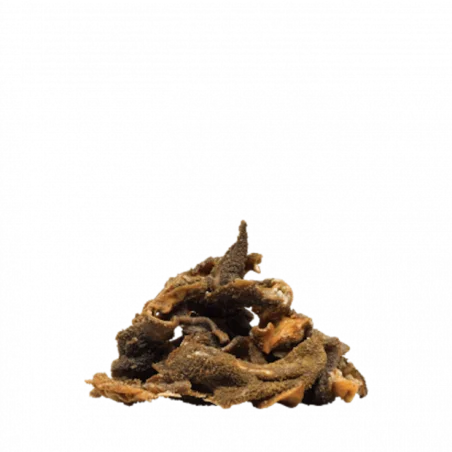
3. Fermented Vegetables
Verdict: Safe depending on the ingredients, but not particularly beneficial for carnivorous cats
Sauerkraut and kimchi are made from fermented cabbage, and may incorporate other vegetables such as carrots and fennel. Sauerkrat can produce up to 10 trillion colony-forming units (CFU) - to compare, many probiotic supplements only provide around 10 billion CFUs.
However, it's always important to check the ingredients and ask your vet about an individual product before giving it to your cat. Many sauerkrat products are safe as they are made with cabbage or cabbage-carrot mixes, but some products may contain onions or garlic, which are toxic to cats. Kimchi often contains garlic and can also contain chilli which cats are sensitive to.
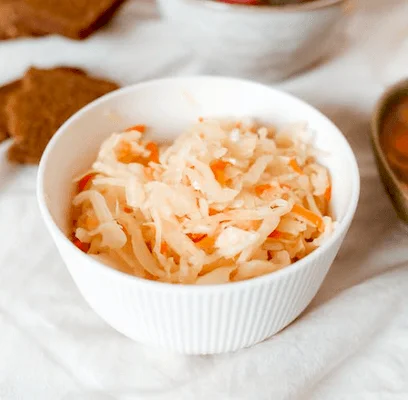
4. Prebiotic-rich Fruits and Vegetables
Verdict: Safe for cats, but not particularly beneficial for carnivorous cats
Certain vegetables have natural prebiotic properties thanks to their fibre type and content. Examples include artichokes, leeks, pumpkin, asparagus, bananas, flaxseed, and chicory root. These items are great for dogs, but don't provide as much benefit in cats due to their requirement for a diet high in animal protein.

5. Psyllium Husk
Verdict: Safe
Usually taken for it's bulk-forming, anti-constipation effects, psyllium husk is also a powerful prebiotic. Psyllium has been demonstrated to increase microbial diversity and numbers, as well as their associated digestive enzymes.10 (Plus, it can help if your cat has anal gland issues!)
When giving your cat psyllium husk, always make sure to select a natural, unflavoured variety free from flavourings. Give around a half a teaspoon, sprinkled on the food daily, and adjust the dose as needed.
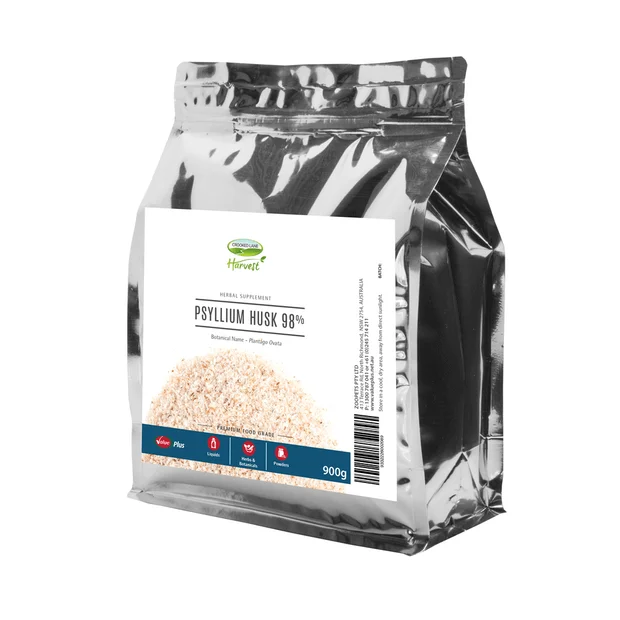
6. Hill's Prescription Diet Gastrointestinal Biome
Hill's Prescription Diet Gastrointestinal Biome is a cat food designed specifically to support the gut microflora without the use of additional supplements. It is currently the only diet on the market which has been created for this purpose. It contains unique ActiveBiome+TM technology - a special blend of prebiotic fibres that works with and feeds the bacteria present in your cat's microbiome to support better digestive health.
Read more about Improving Your Pet's Microbiome Using Hill's Prescription Diet Gastrointestinal Biome.
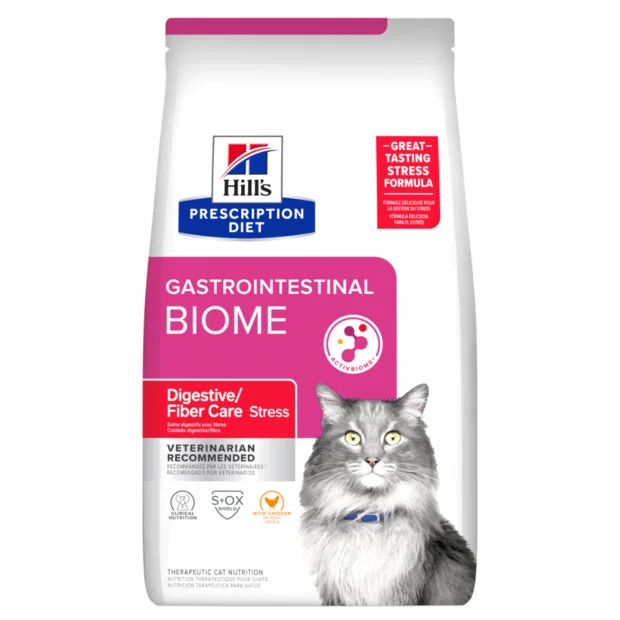
All in all, probiotics are a safe and simple way to promote the everyday health of your dog - and may be particularly beneficial for any dog with allergies, gastrointestinal problems, or chronic diseases. Whether you choose to purchase an daily supplement or introduce prebiotics into their diet, every dog can benefit from a bit of extra care for their microbiome.
Further Reading
Want to read more? Check out our other articles:

